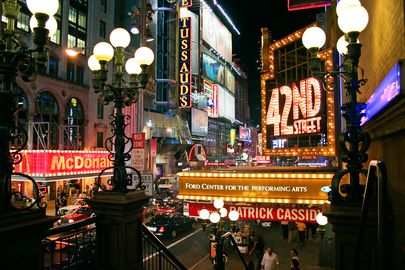

The most interesting thing about this neighborhood, which lies between 34th and 59th Streets and Eighth Avenue and Hudson River, is doubtless its name, whose origin has still not been determined. Some say the name refers to a squalid multi-family dwelling that stood in the zone. Others say it was named after a slum in London. Then there is the version of a German restaurant that had once existed in the zone, known as Heil's Kitchen, named after its owner. Finally, there is the theory that the neighborhood took its name from two police officers who, while dispersing a riot, remarked that, "This place is like hell; no hell's too mild - this is hell's kitchen."
No matter which version is correct, one thing is known for sure: Hell's Kitchen was once one of the two poorest, filthiest, most dangerous and most neglected slums in Manhattan - the other being Five Points in today's Chinatown. At the turn of the 20th century, during the boom of European immigration to the US, it was inhabited primarily by working-class Irish immigrants, who had fled the Great Famine back home, preferring to live in the most horrid conditions just in order to survive and maybe, with luck, participate in the American dream. The zone was controlled by criminal gangs, especially after Prohibition was introduced in 1919, and the city's authorities had practically no way of managing the situation. Only in the 1930s, after the repeal of Prohibition and with the construction of the Lincoln Tunnel, which provided lots of work for the local residents, did the area begin to change. Gentrification began with the construction of the third Madison Square Garden and the underground Penn Station, which resulted in the creation of 25,000 apartments and 3,000 hotel rooms.
Perhaps the most famous institution that can be found in Hell's Kitchen today is the Actor's Studio, New York's premier acting school, founded in 1947 at 432 West 44th Street, between 9th and 10th Avenues. Its most illustrious teacher was Lee Strasburg, from 1951 to 1982. Currently, it is owned by Al Pacino and Harvey Keitel. Due to the importance of the Actor's Studio many big talents have resided in Hell's Kitchen in the second half of the 20th century: Charlton Heston, James Dean, Burt Reynolds and Sylvester Stallone, to name just a few.